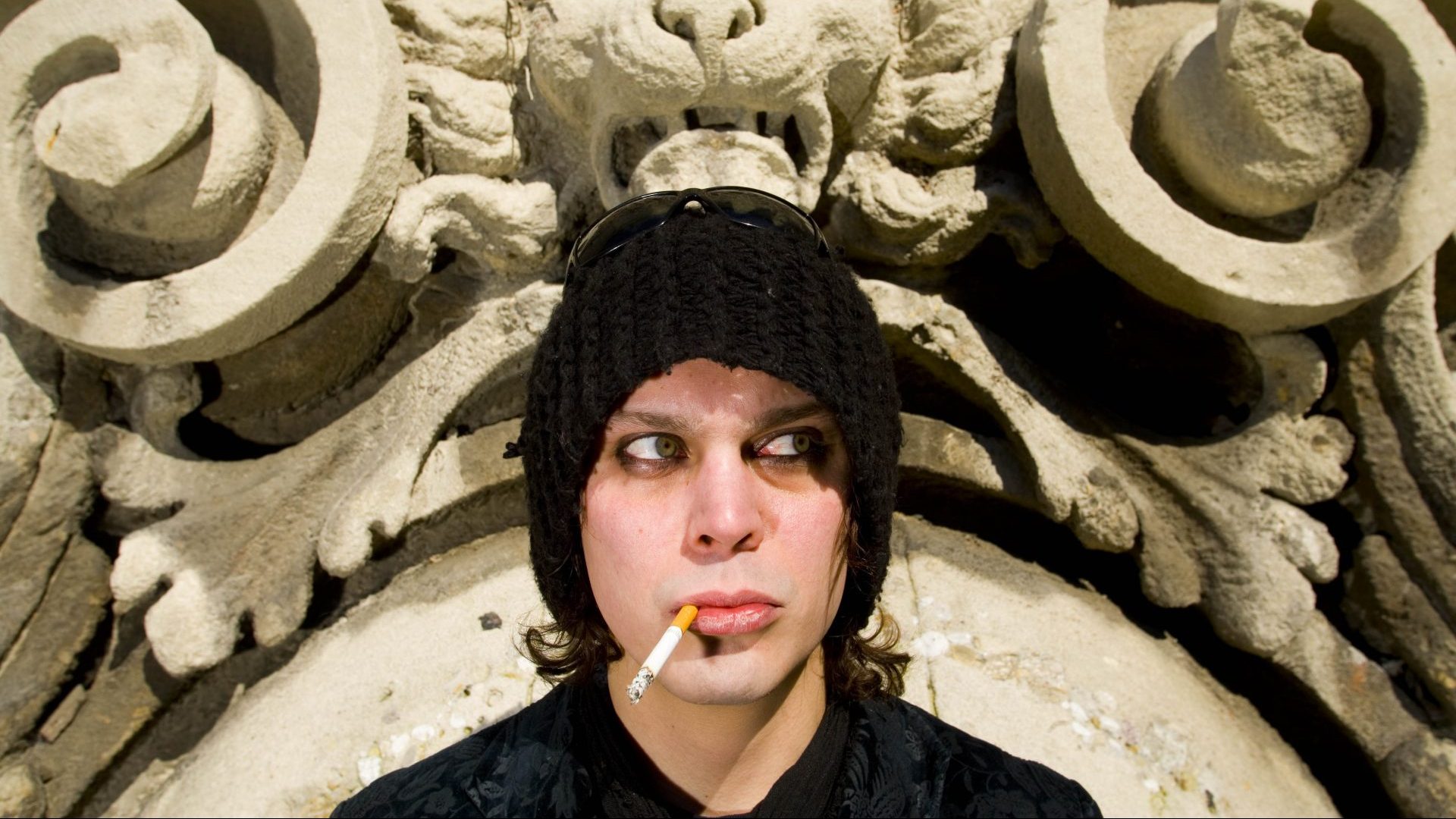“Leave me, leave me, Just say that you need me,” sang Nina Persson on 1996’s
Lovefool. It’s a prescient lyric for a song that’s come to define the Swede and her band, the Cardigans.
Success gave Persson the means to realise a dream and leave her “boring”
hometown. But nearly 30 years of fame later, she has realised how much she needs her country and is happily ensconced back in her homeland after globe-trotting tours and a spell living in Manhattan.
These days, she keeps the Cardigans firmly in the wardrobe, with occasional airings – the band that made her famous have long since stopped making new music, but they do still get together to perform shows when the mood takes them. Yet new sounds remain very high on her agenda: the ones she picks up on in her new home in vibey Malmö; the ones her students produce at the Rhythmic Teaching Conservatory in Copenhagen, just across the Øresund Bridge; those she has created in a collaboration that has borne fruit with a new album released this month.
Back in the early 90s, Persson and her bandmates (guitarist Peter Svensson, bassist Magnus Sveningsson, drummer Bengt Lagerberg and keyboardist Lars-Olof Johansson) dreamed of making it big as a ticket out of their Jönköping residence.
“I wouldn’t say it was Sweden that was necessarily boring [at the time] –
just that particular town,” Persson remarks. “But it was very safe – there were also a lot of good things about it. But once I got interested in a certain
type of music it was a place that didn’t really work with us.
“We were the only people not religious, wanting to play music that sounded like English music. So in that way it was a boring town. Malmö, where I live now, is not boring. Sweden is not boring – I quite like it. But I’m also at an age (48) where I might not need the sort of outside stimuli to operate and be happy. New York was amazing to live in, for sure.”
Although the band’s 1994 debut album was only initially released in Sweden and Japan, the title – Emmerdale – was a tribute to their love of all things British. “The Swedish translation of the TV show Emmerdale is ‘back to the farm’ (Hem till garden). All the seasons were broadcast in Sweden but at the time when we named our record Emmerdale it was basically only grandmothers who watched it; before they had plane crashes in it, which I heard the show eventually evolved into. We also called ourselves the Cardigans because we were Britophiles – we loved British music, culture and language.
“I remember I was accepted into the group because I dropped names like the Stone Roses, the Sundays and the Smiths. They were my favourite bands
of the time and big influences on us. We went to see Ride early on in our boring home town! The birth of Britpop in the early 90s.”
While the Cardigans were influenced by British music, it was the success of some of their compatriots that helped to smooth the path to fame and fortune. Their second album, Life, was given an international release; Carnival became their first UK Top 40 hit in 1995, followed by two songs originally off Emmerdale also quickly charting the same path (Sick & Tired and Rise & Shine).
Persson remarks: “We were very much helped by Swedes preceding us because we were signed to a label (Stockholm Records) that had already
had experience with Swedish artists working internationally, so there was
already a network. We never had a hard time making it in the early years,
sometimes I think we had it too easy – our temperament as artists and people might have benefited from a slower rise back then. We had to talk a lot about ABBA and Ace of Base but again, I think we owe them. But now I am proud of what we have done. I enjoy playing the music still, people still
show up. It’s interesting to be part of a movement. I follow it and I enjoy it.”
Their global breakthrough came with a song off the third album, First Band on the Moon. Initially released as a single in 1996, Lovefool enjoyed respectable chart positions around Europe. But it wasn’t until the song was re-released after being used in the Baz Luhrmann movie Romeo + Juliet – and the video was remade featuring clips from the film – that the song broke the band in the US.
Typical of a lot of the Cardigans’ back-catalogue, Lovefool had a less saccharine lyrical undercurrent than Persson’s velvet-coated vocals suggested. When it came to the Cardigans, one needed to follow the dark to see the light. Fellow Scandinavians A-ha have adopted similar methods in their work, so is it a Nordic thing?
Persson considers: “It could be but I’m not sure. Isn’t it a universal thing, really? If you made stats there are few pop or rock songs that are only bright – that’s very rare. The rest of them are dark! I’ve always had a hard time talking about the Scandinavian mentality but I think it’s art [in general]. I think what we are drawn to – which might be a Scandinavian thing – is to sort of ‘Trojan Horse’ your product; put it in a costume of something that’s light and upbeat.”
Enjoying hits in America with Lovefool and My Favourite Game (from follow-up album Gran Turismo) opened up the doors to “Planet Celebrity” for a band that wasn’t naturally comfortable with playing along. While they didn’t accept every offbeat invitation that was put to them at the height of their
popularity, they did perform Lovefool on US teen drama Beverly Hills, 90210. It ranks alongside New Order playing Regret on the set of Baywatch among
the more dichotomous rock performances of the 90s.
Persson recalls: “Being on 90210 was surreal and it was something – because we were really grumpy and snobby – that we wanted to say ‘no’ to. But we were talked into it and now I’m really happy to have done it because it’s really fun to be part of that nostalgia. But at the time it was really out of our character to be there on a Hollywood set and that exposure, too. I would be arrogant and stupid to not be super grateful to have had these opportunities. And I also think it’s fun because I’m not a snob any more,” she says with a laugh.
The Cardigans didn’t accept all the offers presented to them – one of Persson’s biggest regrets is not submitting a song for the James Bond film Tomorrow Never Dies due to their workload at the time – but they still packed a lot into their heyday. “We were on Letterman and all those big American shows at the time,” says Persson, “as well as a lot of weird TV shows! We did Jools Holland, which was amazing to be operating in a segment where we got to do all these fun things.
“We got to do the MTV Video Awards and sit next to all the crazy celebrities of the time; the Tom Jones duet (Burnin’ Down the House) – if you talk about what you can brag about, I don’t brag so much about that, but people find it a
really exclusive thing that we did. We were also on a really early NME Brat
Bus tour (1996) – a lot of people wouldn’t be impressed by that, but it was very significant at the time. I’m just saying what I’ve come up with, but am probably missing something.”
The 21st century has seen Persson record with a number of different artists, including two more albums with the Cardigans, two under the guise of A Camp and a solo recording in 2014 (Animal Heart). She is married to American musician and composer Nathan Larson – also a member of A Camp – and they lived in New York for several years. They have now settled
back in Malmö, with an additional family member.
“The move back to Sweden was both practical and emotional,” Persson explains. “I had been quite ill (she was diagnosed with cervical cancer in 2009) and then had a child (Nils) in USA, so I was fed up with the US health and childcare systems. Before that all was easy, floating back and forth with my husband/boyfriend, both of us being musicians and freelancers and young.
“And Malmö, that we had happily left, started to change and we saw this every time we visited. From a proud blue-collar rock’n’roll town to more of a sort of Berlin; more people of all origins – refugees, immigrants, students, artists – started to move in, our old fun friends got kids and wanted to stay, so the town just grew on us.”
Malmö is also convenient for access to her teaching role at the Rhythmic
Teaching Conservatory in Copenhagen, at which she has committed to another year leading a class in “artistic development work”.
As well as inspiring the next generation in the classroom, Persson’s musical focus right now is on a project with James Yorkston and the Second Hand Orchestra (a Swedish collaborative). An album comes out this month, followed by a UK tour in February.
The recording process for The Great White Sea Eagle was different to anything
Persson had experienced before, reliant on improvising a set of songs introduced to the group by Scottish folk musician Yorkston. Persson asked to have a preview of the songs beforehand in order to feel more comfortable with the unusual recording environment she would be entering.
“We are about the same generation, James and I, and we’ve both been working in the industry for many years so we have a lot in common there,” says Persson. “We’ve been working with music through the same eras.
She adds: “It was simply something that I felt a connection to. I liked the music, I liked the project – for my own curiosity and development I thought it was something that would take me in a direction that I was excited about.”
With a school-age child and her regular teaching assignment in Copenhagen, Persson is more firmly rooted in Scandinavia than she has been for decades. Her days of long-winded global touring are behind her but the shorter, intense run of concerts in the UK with James Yorkston and the Second Hand Orchestra suits her nicely:
“Three weeks in February is very long for me [these days]. I haven’t done
that in many, many years. Long tours are not for me. It doesn’t really work as
a vocalist – it wears on you as you work with your body – but this project with
James is something where you have to consider long tours again.
“With the Cardigans, you can just say ‘yes’ to the shows that simply help the economy enough, so we don’t have to play every night, but this time we have to maximise it. So it will be a little bit of a blast from the past to be on the road like that again. But it will be fun – there are really great people involved and that helps.”
The Great White Sea Eagle by James Yorkston, Nina Persson and the Second Hand Orchestra is released on January 13 on Domino. They will be touring the UK in February (see jamesyorkston.bandcamp.com for more details)



